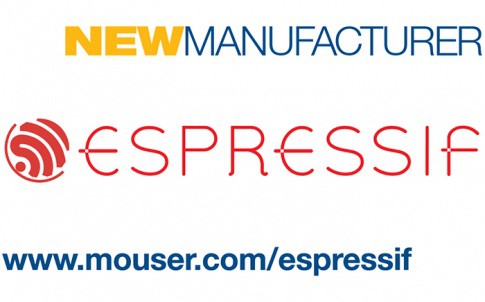
Mouser Electronics, Inc., the New Product Introduction (NPI) leader that empowers innovation, announces a global distribution agreement with Espressif Systems. Through the agreement, Mouser is now an authorized distributor of Espressif's popular and affordable line of ESP8266 and ESP32-based low-power wireless systems-on-chip (SoCs), modules, and development boards for Internet of Things (IoT) applications.
The Espressif portfolio of solutions, available from Mouser Electronics, consists of a comprehensive assortment of innovative, versatile solutions that enable low-cost wireless connectivity for a broad range of wireless applications. Espressif’s ESP8266EX, ESP8285, and ESP8089 Wi-Fi SoCs are highly integrated Wi-Fi solutions based on a low-power 32-bit Tensilica microcontroller. The SoCs incorporate antenna switches, a power amplifier, and other components onto a compact 5x5 mm QFN package. The single-chip solutions feature system-level power management and offer SPI, SDIO 2.0, and UART interfaces, with the ESP8266EX and ESP8089 SoCs also offering I2C, I2S, PWM, and GPIO.
ESP32 SoCs are a single 2.4 GHz Wi-Fi and Bluetooth combo chips designed for mobile and wearable devices and the IoT. The chips feature a dual-core system architecture with two Xtensa LX6 CPUs, and integrate radio and antenna switching circuitry with ultra-low power consumption. The ESP32-DOWDQ6 and ESP32-DOWD SoCs feature 520 Kbytes of SRAM, 448 Kbytes of ROM, and 16 Kbytes of SRAM in RTC. The ESP32-D2WD includes the same features of the ESP32-D0W, but adds 2 Mbytes of embedded on-chip flash memory.
Espressif single-core Wi-Fi modules are fully pre-certified, allowing faster time to market with reduced development costs. Both the ESP-WROOM-02 and ESP-WROOM-S2 feature an embedded ESP8266EX chip and 2 Mbytes of flash memory. The ESP-WROOM-S2 can work as the SDIO/SPI slave, with SPI speed up to 8 Mbps.
Espressif dual-core Wi-Fi and Bluetooth low energy modules are high-performance, low-power devices designed to provide a complete wireless solution tailored to advanced IoT applications. Both the ESP-WROOM-32 and ESP32-WROVER modules are based on the ESP32-D0WDQ6 SoC and include 4 Mbytes of flash memory. The ESP32-WROVER (with PCB antenna) and ESP32-WROVER-I (with IPEX antenna) add 4 Mbytes of external pseudo-static random-access memory (PSRAM) that supports audio products and other applications.
Mouser also offers a selection of Espressif’s versatile development boards. The ESP-WROVER-KIT is Espressif’s most versatile development board. The board, compatible with ESP32 modules, offers a rich list of features, such as onboard high-speed microSD card interface, VGA camera interface, as well as a 3.2-inch SPI LCD panel and I/O expansion capabilities. The ESP32-DevKitC includes a mounted ESP-WROOM-32 module that combines Wi-Fi, Bluetooth Classic, and Bluetooth low energy, and offers a pinout optimized for including the board on a breadboard for easy prototyping. The ESP-Launcher is a Micro USB-powered development board that allows access to all 32 pins of ESP8266 SoC. The board helps engineers develop solutions based on the ESP-WROOM-32 module as well as the ESP32 SoC.
To learn more, visit www.mouser.com/espressif.http://www.mouser.com/nxp-s32v234-processor/










Water Sector Talent Exodus Could Cripple The Sector
Well let´s do a little experiment. My last (10.4.25) half-yearly water/waste water bill from Severn Trent was £98.29. How much does not-for-profit Dŵr...